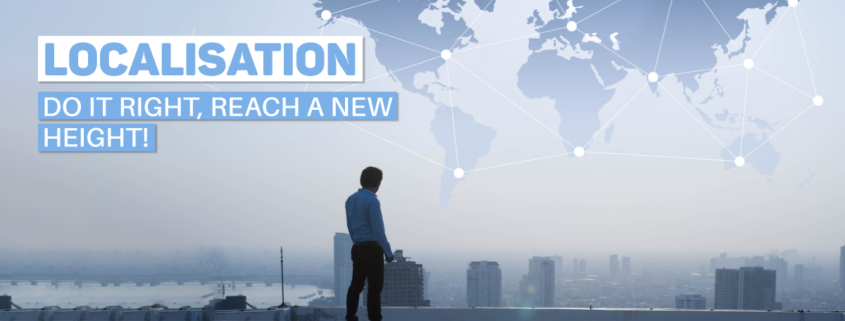Localisation: Do It Right, Reach A New Height!
What is Localisation?
Where almost half of the global population communicates by the means of merely 10 different languages, the rest of the people use nearly 6000 different languages and dialects. This vast lingual diversity makes it very challenging for businesses to become ever-present despite the disappearing of other trade barriers, making localisation one of the most necessary and demanded language services in the industry. Defined as the process of adapting a product or content to a specific locale or market, localisation is much more than just direct translation of product specifications or benefits, it is about carefully refining and adapting content to resonate with cultures and to meet local peculiarities.
In addition to translation, localisation process may also include modifying content to suit the tastes and consumption habits, using proper local formats for currencies, units of measure, dates, addresses, colours, symbols and phone numbers, and addressing local conventions, regulations, and legal requirements. The aim of localisation is to give the product the look and feel of being created specifically for the target market to communicate effectively to global audiences.
Chemical Industry Localisation in the UK
In the chemical industry, as one of the largest, most important and most quickly flourishing industries worldwide, localisation service is considered a key player in customer reach and industry expansion. Noteworthy companies, who influence the chemical industry, as well as other industries, including Johnson Matthey, Synthomer, Croda International, Elementis, and Victrix that gained the highest revenue of the leading chemical companies in the United Kingdom (UK) in 2018, developed new methods of expansion depending on localisation, where Asia, Latin America, and the Middle East are considered as places to build capacity, tap local talent and access new customers.
Aiming to successfully commercialise chemical products in many local markets and survive the pressures of global competition, the companies developed product campaigns that have been subjected to translation and localisation to the highest standards of quality. Also, in order to pass regulatory audits in different world markets, documentation – such as technical dossiers, Chemical Safety Reports (CSR), and Material Safety Data Sheets (MSDS), operational manuals, marketing materials, Summaries of Product Characteristics (SPC), and other vital material – should have been presented in the local language of each country according to its regulations.
For example, in Europe, companies have to fulfill the requirements of REACH (Registration, Evaluation, Authorisation, and Restriction of Chemicals), which addresses the production and use of chemical substances, and their potential impacts on both human health and the environment, REACH also established the European Chemicals Agency that manages the technical, scientific and administrative aspects of the regulations. REACH states that documentation must be in the language of each member state where products are sold.
Companies That Did It Just RIGHT!
To understand the true extent and impact of localisation, let us investigate some examples where companies could achieve exactly what they intended from the executed campaigns.
Croda was so excited to launch their new ‘Be Skinspired’ formulation campaign, which would showcase its formulation expertise. Building on the novel formulations and themes previewed at the in-cosmetics trade show in Paris, France, Croda were establishing themselves as the ‘go to’ company for formulation expertise by addressing each audience in his own way. The ‘Be Skinspired’ formulation campaign adapted well and addressed the meant audience where they targeted; asserting that the truly inspired skin care formulations would contain novel Croda ingredients, natural botanical ingredients from Crodarom and ingredients from Sederma’s range of skin care actives. Combining these essential building blocks is a winning formula for the creation of the perfect total formulation package. Corda achieved the expected success because they took the time to study, plan, and localise it.
Essentials To Consider While Localising
Though chemical companies often spend millions launching global campaigns to achieve their targets, it would end up into something that was not exactly intended in the target country, sometimes with emphatic offensive results because of an unnoticed mistake in using names, colors, numbers, symbols or even gestures. This is where localisation helps prevent such fatal errors by supporting a more appealing user experience for your diversifying clientele and increasing your overall customer conversions.
In essence, localisation success depends on the fine balance between having a worldwide brand that your customers can easily recognise and ensuring that the brand is ‘localised’ enough for people in different cultures to be able to relate to and understand. This is why there is a number of simple things you should overlook when localising your global online presence, including:
- Using the correct standard terminology
- Following regulations and conforming to the requirements of leading industry associations
- Localising the contact details such as Postcodes/Zip codes, street names, and numbers and currency choice
- Offering country specific delivery options
- Setting payment choices with attention to the cultural payment preferences
- Ensuring refined and professional translation with much care to the local specifications.
TW Languages Localisation Services
TW Languages – the professional, multi-lingual translation services provider– provides its quality business translations to organisations throughout the world. Our top clients include, and not limited to, Kaizo, Luxson, and Pearson UK, with whom we actively adopted localisation and translation projects of applications, style guides, brand slogans, and advertisements.
We offer precise translation and localisation solutions developed and performed by our experienced and most talented translators and linguists, working with a primary approach to combine the latest technologies with the human perception to preserve the context. TW Languages has built-in content management solutions that can effectively translate HTML files, in addition to the capability and bandwidth to work alongside WordPress, Joomla, TYPO3, and certain e-commerce platforms, precisely for integrating translations directly at the core of the concerned website.
If your business strategy focuses on increasing revenue, market share and customer base, localisation is then a necessity for that business.
Localise your business now and deliver your message exactly the way you want.



